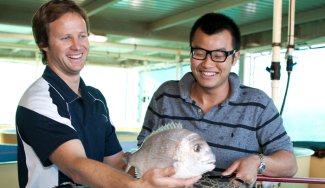

Why choose this course?
Further your knowledge in aquaculture and sustainable food sources with this qualification. This course will build your knowledge in fish farming by giving you the skills to be able to plan, install and construct structures to house fish and other species. During your studies you will acquire the skills to create a balanced environment for stock by ensuring the water temperature and flow are all of good quality, which is vital for healthy fish stock. Your newly gained knowledge will also give you the opportunity to identify and treat diseases and dispose of effluent wastes when required.
Part of this course involves harvesting stock, carrying out postharvest operations and arranging stock transport. It will be your responsibility to operate high technology water treatment components and implement emergency procedures and occupational health and safety guidelines if they arise.
This qualification is very practical and hands on with extensive salt and freshwater facilities located at the campuses.
If you want to further expand your aquaculture skills then consider studying the SFI50119 Diploma of Aquaculture for a further 12 months.
Career opportunities
- Aquaculture Farm Attendant
- Pond Worker
-
An IELTS score (academic) of 6.0 with no band score less than 5.0 or equivalent.
-
Completion of the equivalent of Australian Year 10.
There may be further semester intakes available for enrolment. You can view any further intakes when you submit your online application(opens in a new tab).
For information about pathways from TAFE to university, view our Pathways to university page.
How to apply
Apply to study at TAFE in six steps:
- find a course;
- check entry requirements;
- submit an application;
- accept your offer and pay;
- apply for your student visa; and
- receive your visa and come to Australia for your studies.
Build your own course guide
Select the study areas, courses and topics you like. Get your custom guide by email!
Download study area guide(opens in a new tab)
Contact us(opens in a new tab)
TAFE International Western Australia (TIWA) is the Registered Training Organisation (RTO) and Commonwealth Register of Institutions and Courses for Overseas Students (CRICOS) provider, for the delivery of training to international students, enrolled in a TAFE course in Western Australia. This nationally recognised course is delivered by a Western Australian TAFE college on TIWA's behalf. TIWA retains responsibility for the quality of the training and assessment delivered by the TAFE colleges and for the issue of certification documentation to students.


